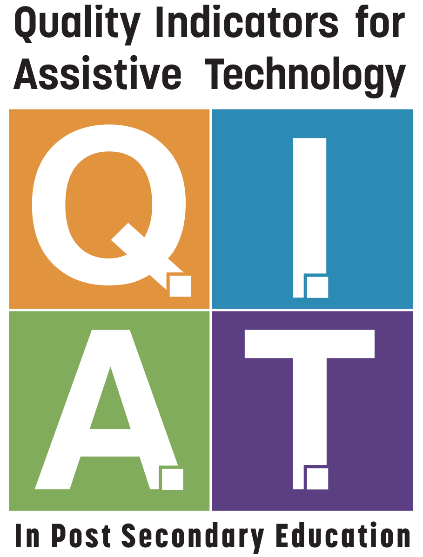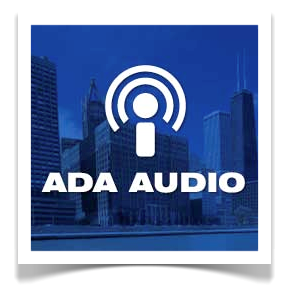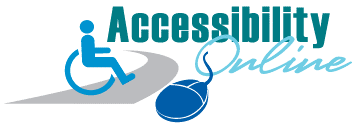The Great Lakes ADA Center serves Illinois, Indiana, Michigan, Minnesota, Ohio, and Wisconsin
The Great Lakes ADA Center is a program of the Department of Disability and Human Development under the College of Applied Health Sciences at the University of Illinois at Chicago.
Quality Indicators for Assistive Technology for Post-Secondary

The Quality Indicators for Assistive Technology in Post-Secondary (QIAT-PS) education gives institutions the ability to self-assess and more effectively direct their limited resources to increase the effectiveness of outcomes for students with disabilities. The QIAT-PS project offers tools and resources on quality implementation of assistive technology (AT) in the post-secondary educational environments. QIAT-PS is a collaborative effort of hundreds of professionals from a wide variety of higher education and K-12 schools and based on the successful implementations of AT indicators in K-12 public schools. Resources available include a Campus Self-Evaluation Matrix tool to measure AT service delivery and it provides an excellent method for institutional self-study to improve AT services at a school as well as a Student Self-Evaluation Matrix that can be used by individuals or teams to help identify the skills needed to use AT in the Post-Secondary environment.
For more info, go to the Quality Indicators for Assistive Technology in Post-Secondary website.
Punch-in Project.png)
Punch-in is an interactive website and social network for young adults with disabilities to navigate the Americans with Disabilities Act, Assistive and Accessible Technology options, and groundwork skills necessary to find and keep employment. The site is fully accessible and features over 40 captioned videos, tutorials, and employment event opportunities.
This project is sponsored by our center with contributing partnership from employment and disability professionals in the Great Lakes ADA Center region and nationally. Formal collaborators include Niche Movement, MN Star Program, The National Collaborative on Workforce and Disability for Youth, PC Coaches, and University of Illinois Chicago Career Services. For more information, go to the Punch-in website.
ADA Audio Conference Series
The ADA Audio Conference Series is designed to support professional development of an individual, an entire department or an entire agency that aims to increase knowledge and awareness of regulations and trends of the ADA.
Each audio conference is led by a leading expert in the topic area, is 90 minutes, and offered in multiple formats. Continuing education recognition is also available upon request. For more information, go to the ADA Audio Conference Series. Topics address current “hot topics” related to the ADA, on-going activities that may focus on ADA enforcement or implementation as well as featured research and special interest projects from the ADA National Network.
AccessibilityOnline
AccessibilityOnline is a series of webinars and audio conferences that are coordinated by the Great Lakes ADA Center. The program represents a collaborative training program between the ADA National Network and the US Access Board.
Legal experts synthesize the case law as it applies to different industries or specific elements of the law including employment, the built environment, communication access, accessible technology and access to programs and services.
This series offers up to date information and direct access to accessibility content experts at the federal level. The monthly program is designed to provide up to date information on the codes, regulations and “common errors” made by designers and contractors when applying the Accessibility Standards. Other topics covered include transportation and information and communication technologies. Each session is recorded and archived to allow individuals to reference this information on an as needed basis. In addition, several of the “core” content sessions are available as “self-paced” on-line programs for AIA credit.
Continuing education recognition is offered via American Institute of Architects (AIA), International Code Council (ICC), ADA Coordinator Training Certification Program (ACTCP) and a Great Lakes ADA Center Certificate of Attendance.
For more information, go to the AccessibilityOnline page.
ADA Legal Webinar Series 
This program is designed for individuals who have a working knowledge of the ADA and are familiar with its basic elements. Sessions are intended to support continued learning and focus on the knowledge that has been gained through understanding how the federal agencies and the courts are interpreting the law and subsequent regulations.
Legal experts synthesize the case law as it applies to different industries or specific elements of the law including employment, the built environment, communication access, accessible technology and access to programs and services.
Continuing Legal Education Credits are available for some of the sessions and Certificates of Attendance are available for all of the sessions. For more information, go to the ADA Legal Webinar Series.
Research Related Activities
The Great Lakes ADA Center is conducting four research projects to identify barriers and facilitators to effective ADA implementation within our region and nationally. Findings from these projects inform ongoing technical assistance and training efforts, and are shared in a variety of formats such as webinars, academic journals, in-person trainings and conference presentations. The research is centered around working closely with various stakeholders that have had success with different areas of ADA implementation. The research includes:
- Conducting a Delphi study on assistive technology in higher education, which including querying a group of national experts working to identify different aspects of student assistive technology use that can impact academic success.
- Creating a national survey about how youth with disabilities’ engagement with online networking platforms is related to their knowledge about disability rights.
- Identifying organizational factors that lead to the successful inclusion of workers with disabilities in large businesses by conducting interviews and analyzing Corporate Social Responsibility initiatives.
- Working with representatives of state and local government to identify successful practices for creating ADA transition plans, and to better understand the role of these plans in the development of accessible cities.

.png)




